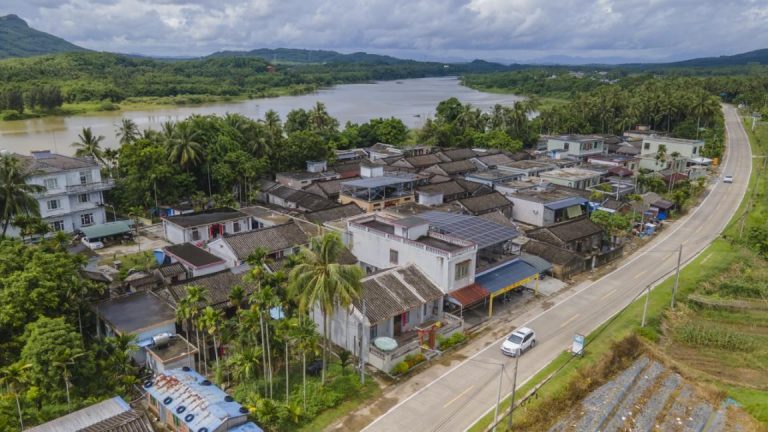
By He Yin, China’s State Council Information Office on Nov. 29 released a white paper titled “China’s Rural Roads in the New Era” to introduce the achievements and vision of rural road development in the new era and to share China’s experience.
China has explored an approach to developing rural roads in light of its realities. Over the years, it has shared its experience in rural road development and helped construct rural road infrastructure in other developing countries, contributing Chinese wisdom and solutions to global poverty reduction, people’s wellbeing and sustainable global development.
Easy access to convenient roads brings happiness to the doorstep. Following a people-centered development approach, China has worked vigorously to meet people’s needs for quality transport.
Upgraded and newly-built rural roads have added up to over 2.5 million kilometers over the past decade. By the end of 2023, the length of rural roads had reached 4.6 million kilometers, accounting for 84.6 percent of the total road length in China.
This safe and convenient transport network has brought about a remarkable transformation in Chinese rural areas, connecting villages and towns to the outside world and expanding bus services to villages. The ongoing development of rural roads will continue to bring benefits to China’s agriculture, rural areas and rural population.
Siddharth Chatterjee, the UN Development System Resident Coordinator in China, said that in China, he saw many outstanding examples of high-quality rural roads that were properly built, managed, maintained, and operated, as well as the resilience of the Chinese transport system.
At present, rural transport is still a bottleneck constraining the economic and social development of many developing countries. China is making concrete efforts to strengthen mutually beneficial transport cooperation with the international community, enabling impoverished areas in more countries to embrace greater prosperity.
The Belt and Road Initiative and the Global Development Initiative proposed by China have given full play to the foundational role of transport in bolstering economic and social development, injecting strong momentum into common progress.
In 2018, a resolution initiated and promoted by China – Eradicating Rural Poverty to Implement the 2030 Agenda for Sustainable Development – was adopted by the UN General Assembly, emphasizing further poverty reduction efforts through infrastructure construction.
By sharing its development experiences through international cooperation mechanisms and helping with the construction of rural road infrastructure in other developing countries, China has made active contributions to global rural road development and poverty reduction.
To improve the wellbeing of humanity, China has played an active role in building new platforms and mechanisms for global transport cooperation and in promoting knowledge and experience sharing. It has met its responsibilities as a major country with practical actions.
China is promoting “soft connectivity” by sharing Chinese standards. Since 2012, the country has released 73 industry standards for highway engineering in foreign languages. They represent a systematic effort in building industry standards in foreign languages and have been applied in hundreds of projects in dozens of countries around the world.
China hosted the Second United Nations Global Sustainable Transport Conference in 2021 and the Global Sustainable Transport Forum in 2023, and has established the Global Sustainable Transport Innovation and Knowledge Center, proactively building new platforms and mechanisms for global transport cooperation.
When it comes to international transport training, China has held 28 training sessions for more than 800 people, including a training program on road design and management in Botswana, an advanced training program on highway engineering for Belt and Road partner countries, a training program for technical personnel in highway engineering in other developing countries, and a training program on road network planning.
China has supported and participated in rural road construction projects in other developing countries, improving people’s wellbeing and promoting sustainable development.
For instance, a post-disaster reconstruction project implemented by the Ministry of Transport and Public Works of Ecuador with China’s support has significantly improved access to transport for around 1.5 million people along the route; and the road construction project on the fringes of the capital of Madagascar, supported by free aid from China, has made it easier to transport eggs from the town of Mahazaza and facilitated the development of local poultry farming. It is known by the locals as the “egg road.”
Since 2018, China has supported 24 developing countries including Cambodia, Serbia, Rwanda, Namibia, Vanuatu and Niger in highway and bridge construction and maintenance. By participating in construction projects and providing technical support and human resource support, China has helped improve rural road infrastructure of these countries, make travel much easier for local people, and reduce logistic costs by a large margin.
Rural roads help to connect beautiful scenery, drive the development of local industries, grow the local economy, and benefit the local people. In a spirit of openness and mutually-beneficial cooperation, China will strengthen international exchanges and collaboration in exploring new models and paths of rural road development, further contributing to global rural road development and poverty reduction, and building a global community of shared future.










